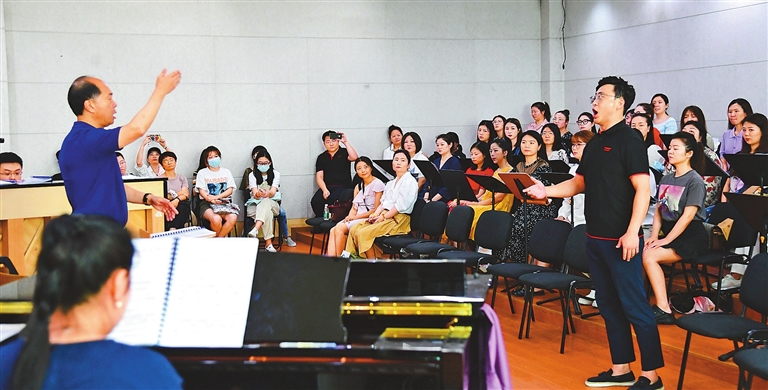
Debra Li debra_lidan@163.com ARRIVING at 3 a.m. in Shenzhen early Tuesday morning, maestro Zhang Guoyong was punctual at the rehearsal a few hours later for a choral concert to be staged at Shenzhen Concert Hall next Friday. Featuring the crew of the Shenzhen Opera and Dance Theater (SZODT), the concert will present “Yellow River Cantata” as well as a five-movement choral work with a libretto inspired by martyr Fang Zhimin’s essay “Lovely China.” Conducted by the artistic director of the SZODT Chorus Xie Yingbin, the first half of the concert features “China, My Lovely Mother” composed by Lu Zaiyi. The libretto was provided by Zhao Lihong and Zhang Hongxi based on Fang’s essay written in prison before he died in 1935. The piece chooses Fang to be the first-person narrator and intersperses solo with chorus to bring tension and drama. It will pluck the heart strings of the audiences with the patriotism and selfless sacrifice of Fang and many others like him. For the second half, Zhang Guoyong, principal conductor of the Shanghai Opera House, will conduct Xian Xinghai’s “Yellow River Cantata,” a choral masterpiece and perhaps the best known choral work from China. Xian composed the piece in March 1939, while he was teaching at the Lu Xun Arts Academy in Yan’an, Shaanxi Province, during the Chinese People’s War of Resistance Against Japanese Aggression. The libretto is a 400-line poem of eight sections written by Guang Weiran (1913-2002), a comrade of Xian, who was inspired by his experience crossing the river on his way to Yan’an a year earlier. The text is a nationalistic and patriotic call to the Chinese people to resist the Japanese invasion. The Yellow River, the “cradle of Chinese civilization,” is a symbol of the spirit of the Chinese people, just as Czech composer Smetana used the Vltava river in his symphonic poem “My Fatherland.” With limited resources in Yan’an, Xian orchestrated the original cantata for harmonica for the wind section, Chinese bowed string instruments for the string section and a few percussion instruments, in addition to vocals. During his stay in the former Soviet Union to study music in 1941, Xian rewrote the cantata in Western notation and introduced changes to the structure, instrumentation and harmonic language of the work. Though with a format rooted in the classical Western music tradition, the piece has significant Chinese content, with folk song influences from Northwest China apparent in “Song of the Yellow River Boatmen,” and the regional narrative style in “Duet by the Yellow River.” Xian wanted the cantata to represent the magnificence of our nation, bringing together the best Chinese music features and Western techniques. Many boldface names and orchestras have performed this piece, but the present production has something new to offer. “With no orchestra of our own to accompany the singers, we have come up with an innovative solution, replacing the orchestra with two pianos,” said Xie, calling their production a “simplistic version.” The SZODT commissioned two composers to recompile the music, with the end effects somewhat refreshing to hear. The behind-the-scenes work may not be visible to the audience; the recompilation, however, does create a few challenges for the two pianists, who need to note every minute change in the music to strike a chord with the singers. It’s not an easy job for the singers either, as conductor Zhang had to stop from time to time during the rehearsal to give them directions. Still, the maestro who had served as the first artistic director of Shenzhen Symphony Orchestra two decades ago praised the young passionate singers of the SZODT. “These young singers, the majority in their 20s, are promising because I see in them a passion for singing,” he said. “They are not rehearsing as a task, or a means of making a living. That’s why I see hope in them.” Zhang also stressed the importance of public performance. “Like soccer players who need to sharpen their skills in matches, musicians need to accumulate their experience on the stage,” he said. Liu Xingfan, president of the SZODT, said the program of the concert serves as a patriotic history lesson for his young crew as well as for the audience. “What can be a better way to pass on our tradition and let the young generation remember our history than revisiting the beautiful music of the past?” he said. The concert, a highlight of the 17th China (Shenzhen) International Cultural Industry Fair (ICIF) Art Festival, will be performed again at Fuzhou Grand Theater in the capital city of Fujian Province in July. | 
